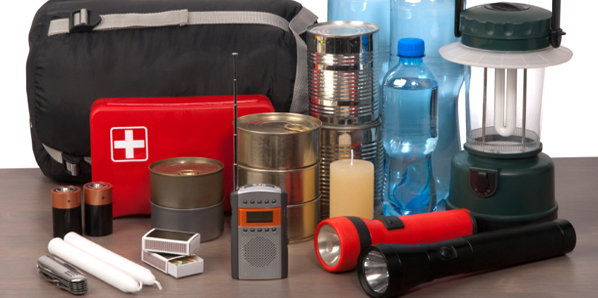Emergency Preparedness Week: Helping Seniors Prepare for Emergencies
Elderly Ontarians are among the most vulnerable to be impacted by a disaster. From May 5th to May 11th, the Ministry of Community Safety and Correctional Services is working to raise everyone’s awareness to be prepared when emergencies arise.
Ontario has faced a number of emergencies over the years—from severe storms and industrial accidents, to flooding and widespread power outages. Many residents have vivid memories of these events and the challenges they faced.
“Who can forget the blackout of 2003 or the 1998 ice storm?” asks Allison Stuart, Chief and Assistant Deputy Minister of Emergency Management Ontario (EMO).
Seniors, naturally, have the most memories…but they are not always fond ones. One senior who lived through the Ice Storm of 1998 remembers the hardship of living without heat: “The apartment was heated electrically so as time went by it got colder and colder. After a week it was so cold that I slept in my bed wearing several layers of clothing including my winter coat and several pants.” (Be Blommesteijn, My Memoirs, The 1998 Ice Storm)
According to the Institute for Catastrophic Loss Reduction, the Ice Storm of 1998 remains the single largest and most devastating natural disaster in Canadian history in terms of financial costs. Twenty-five people, many of them seniors, died from frost and other storm-related causes.
Elderly Ontarians are among the most vulnerable to be impacted by a disaster. As Stuart says: “Authorities, families and seniors themselves must all be sensitive to the special needs of older citizens during emergencies.”
Read more on this topic with Five Tips to Prepare Your Elderly Loved Ones for Emergency Situations
However, as Stuart points out, “seniors also have a lot of experience to draw on and are very well placed to help themselves, and each other.” For instance, past emergencies have shown that Ontario’s seniors are very resilient and are able to assist their communities during an emergency response and in the recovery that follows.
This does not always mean they are well prepared for an emergency. A 2012 members’ survey conducted by CARP, a group promoting the well-being of older Canadians, showed that 55 per cent of respondents indicated they felt they were not adequately prepared for the next disaster.
Older Ontarians make up a large percentage of the people of this province and the population is ageing. So, it should come as no surprise that Ontario is focusing on seniors and their preparedness for this year’s 18th annual Emergency Preparedness (EP) Week.
EP Week, which is recognized across the country, serves to remind us that while all governments work hard to keep their citizens safe, everyone has a role to play in being prepared. When citizens are prepared for emergencies, they contribute to their own safety and their community’s resilience, and they free up first responders to take care of those in greatest need.
In preparation for EP Week, EMO collaborated with the Ontario Seniors’ Secretariat and the Ministry of Health and Long-Term Care to develop resources to raise awareness and help seniors better prepare for an emergency. These resources are available on EMO’s website.
The simple fact is that, no matter what their living conditions, seniors can and should prepare for emergencies. Seniors who live independently or who are supported at home by friends or family can put together an emergency plan and emergency survival kit. Seniors who live in long-term-care homes also benefit from emergency planning and preparedness because such facilities must have contingencies in place in case of emergencies.
Learn more about Long-Term Care retirement communities
For seniors and families undertaking preparedness in their own home, it’s as easy as following these three steps: 1) make a plan, 2) assemble a kit, and 3) stay informed.
Making a plan means thinking about what you would do during an emergency—for instance, where you would go if you had to evacuate your home, who you would contact, how you would get in touch with family.
A survival kit is something that everyone should have. It should contain all that you would need to be safe and take care of yourself and your family for at least three days. This includes non-perishable food, an adequate supply of water (4 litres per person, per day) and other essentials.
Finally, it’s important to be aware of emergencies as soon as possible. You can be informed by signing up for Ontario’s emergency alerts. EMO also recommends that residents learn more about Ontario’s hazards and how to prepare for them.
Detailed information and tools for becoming prepared are all available on EMO’s website: www.ontario.ca/beprepared.
This EP Week, May 5–11, Stuart urges everyone in Ontario to “do yourself and your loved ones a favour: take the time to prepare for an emergency.” The tools and information you need are only a click away.
[ Article provided by Andrew Morrison, Media Relations, Ministry of Community Safety and Correctional Services ]
* * * * *
How do you prepare your loved ones for emergencies? Share your thoughts in the Comments section below.


